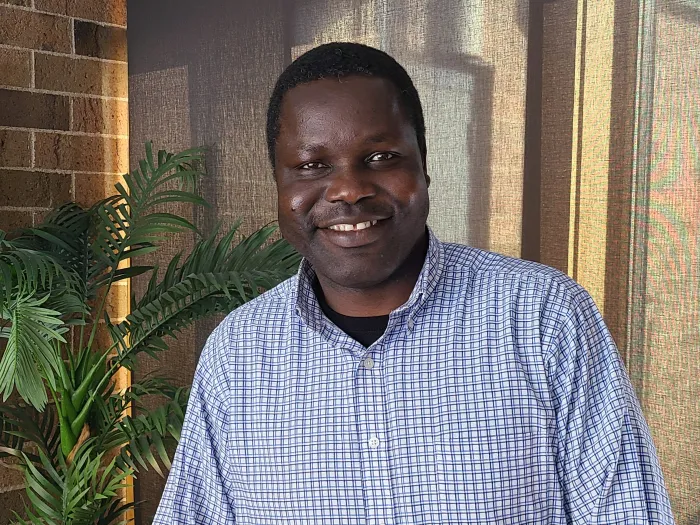How and why we trust one another
Synod of the Covenant hosts ‘The Psychology of Polarization’

LOUISVILLE — Dr. Dom Packer, who teaches Psychology at Lehigh University and is Associate Vice President for Research, led an informative online discussion Tuesday on trust and distrust and the roles they play in the nation’s current polarized state.

Packer, the co-author with Jay J. Van Bavel of “The Power of Us,” spoke during a Science for the Church workshop, “The Psychology of Polarization,” offered by the Synod of the Covenant. Watch the 85-minute presentation and discussion here.
We humans rely on three kinds of trust, Packer said: network- or relationship-based, group-based and institution-based.
The first is based on personalized trust and cooperation. Gossip is one example. “We learn who’s behaved well and who’s behaved badly,” he said. The science shows the groups we belong generally max out at 150. “Given the size of our brain, we should be able to handle this size of network,” he said. Pathologies with these groups include nepotism and formation of “the old boys club.”
But political polarization “degrades bonds between people who would not have great difficulty trusting or liking or collaborating with each other,” Packer said. Still, about 7 in 10 OKCupid users “do not think it’s a dealbreaker if their date is voting for a different political candidate,” Packer noted.
Identity- or group-based trust is depersonalized trust and cooperation. The Apostle Paul mentions this kind of trust in his letter to the church at Corinth. “The group’s interests are now your interests,” as Packer put it. Packer cited the work of Mark Levine, who did experiments with British soccer fans, as well as public goods games, which are exercises in economics designed to measure trust and cooperation.
“Our identities are malleable, and it changes how we behave,” Packer said. “There is a reason humans are so eager to signal their identity to others.” Think of the apparel industry, where millions of us affiliate with our sports team or our alma mater by wearing an article of clothing. One could also make the case this is the reason people wear religious symbols, according to Packer. “It says, ‘Hey, we’re part of the same community.’”
The pathologies with this type of trust include parochialism and discrimination. Some current researchers even say that our hatred for the other political party is stronger than the love we feel for our own party, he said.
The third category is institution-based trust, depersonalized trust grounded in rules, procedures and structures that regulate interactions, Packer said. “If I go into a restaurant, I feel good about handing over my credit card to someone I don’t know,” he said. There are procedures in place to protect us if we are ripped off by, say, a criminally-minded cashier.
Pathologies here include rigid, impersonal treatment and potential discrimination.
Religious organizations incorporate all three realms of trust, Packer said. “A common thing you hear is people are attracted to a church or synagogue or mosque because of the community,” he said. Religion is a shared identity, and churches also serve as institutions complete with rules and traditions.
In a question-and-answer time following Packer’s presentation, the Rev. Drew Rick-Miller of Science for the Church asked about best practices for cultivating trust.
“When people share stories with each other, it creates empathy, which is stronger than ‘Why I’m right and why you’re wrong,’” Packer said. “Jay [co-author of ‘The Power of Us’] and I thought the pandemic would unite people, but we didn’t see that happening in the U.S.” It did occur in Canada and New Zealand, but not the U.S. “It had to do largely with the reaction of leaders,” Packer said. “When the rules aren’t fair, it makes trusting a lot harder, and some groups are clearly being treated unfairly.”
For pastors and other church leaders, “the story is the entryway,” Packer said.
“Groups have foundational stories they tell,” Packer said. Especially in the New Testament, “all the parables are stories and they became foundational to the church. They’re told over and over again, and everyone knows them. They’re touchstones.” When one mentions “loaves and fishes, everyone knows what you’re talking about.”
“What are those stories you want to tell again and again?” Packer asked. “What stories do leaders tell about who we are? Are they really about who we want to be?”
Rick-Miller commended “Outraged,” a recent book by Dr. Kurt Gray, who previously spoke at a Science for the Church webinar offered by the Synod of the Covenant. Rick-Miller called the book pastoral, because it invites leaders to connect, invite and validate stories. “Very much like we’re trained pastors,” he said, “we listen and validate people’s experiences. I think that’s a powerful way to build bridges.”
You may freely reuse and distribute this article in its entirety for non-commercial purposes in any medium. Please include author attribution, photography credits, and a link to the original article. This work is licensed under a Creative Commons Attribution-NonCommercial-NoDeratives 4.0 International License.



